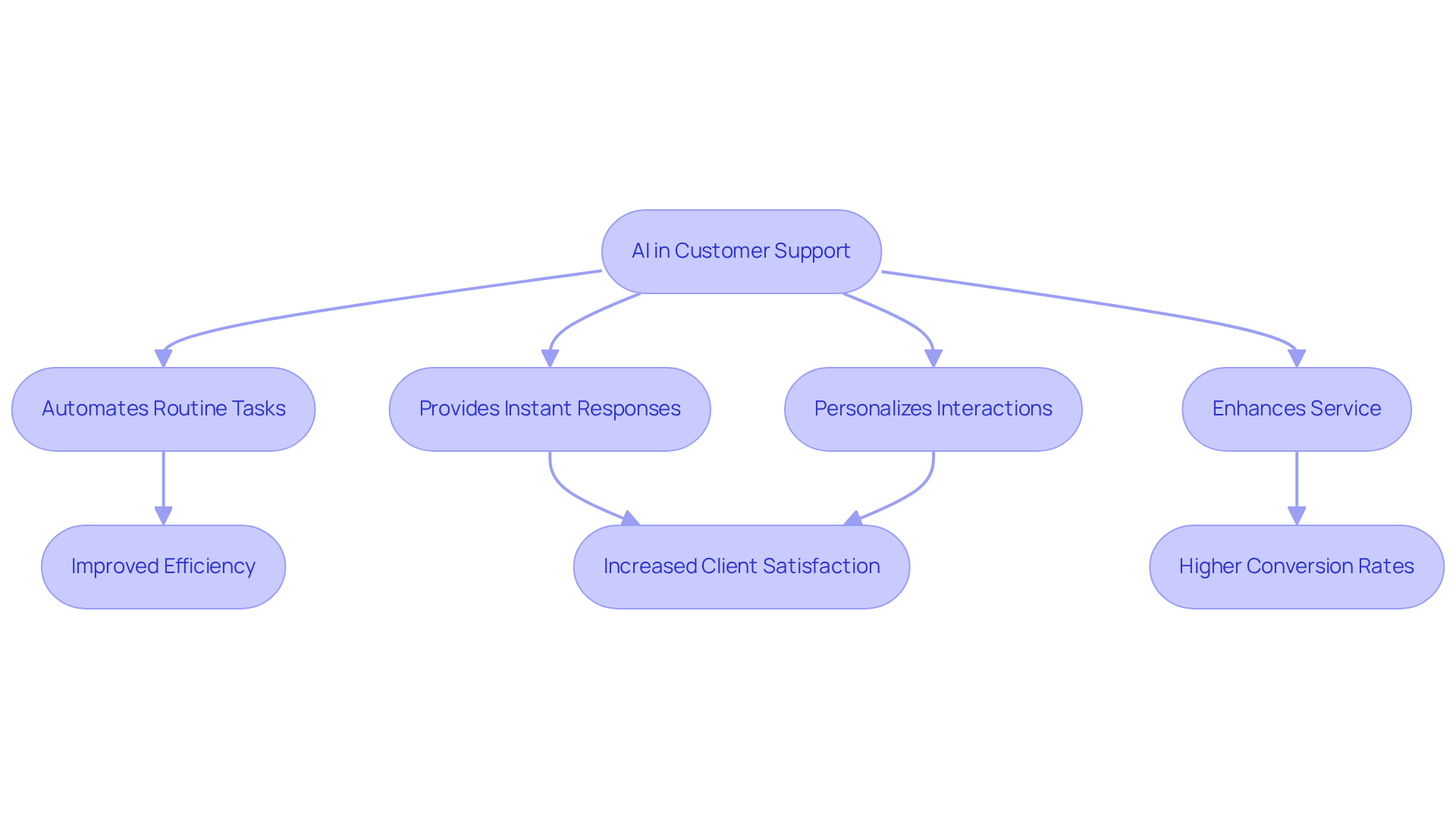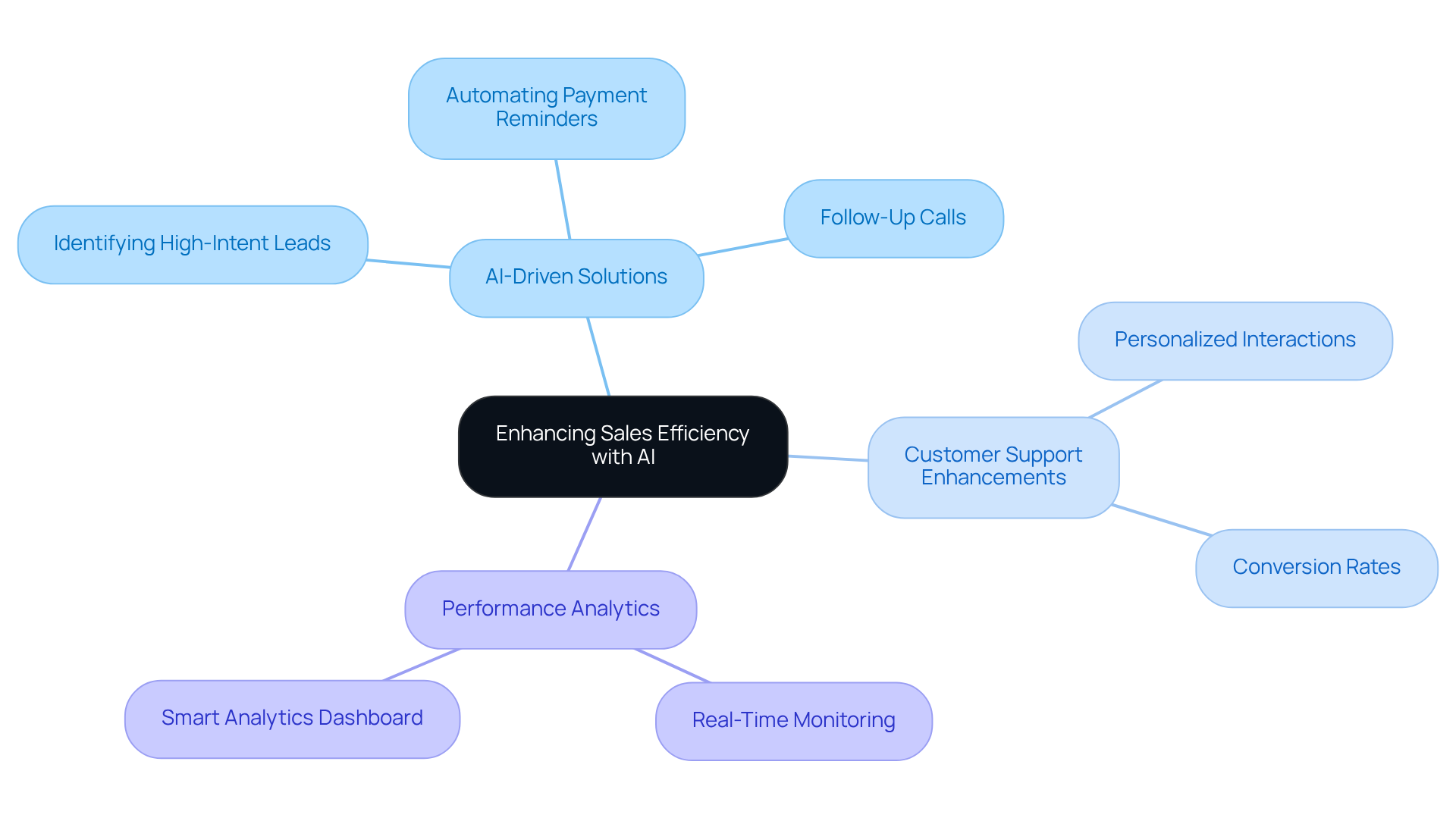Overview
This article explores how businesses can significantly enhance sales by incorporating artificial intelligence into their customer support systems. By emphasizing automation, personalization, and efficiency, it captures the reader's attention and builds interest in the transformative potential of AI. Notably, AI tools, such as Intone's voice assistants, are highlighted for their capability to manage routine inquiries and analyze customer data effectively. This leads to improved response times, increased conversion rates, and ultimately, greater client satisfaction. The insights presented not only underscore the necessity of adopting AI but also prompt action towards its implementation, positioning it as a critical component for modern business success.
Introduction
Artificial intelligence is revolutionizing customer support, fundamentally transforming how businesses engage with clients and streamline operations. By automating routine tasks and providing instant, personalized responses, AI not only enhances efficiency but also drives sales growth. However, as organizations rush to adopt these technologies, they encounter the significant challenge of effectively integrating AI into their support systems.
How can companies harness the full potential of AI to boost sales while ensuring exceptional customer experiences?
Understand the Role of AI in Customer Support
The role of artificial intelligence customer support is transformative as it automates routine tasks, provides instant responses, and personalizes interactions. Intone's 24/7 AI voice assistants are specifically designed to enhance service by instantly addressing FAQs, managing order inquiries, and even resetting passwords—all without requiring additional effort from your team. By leveraging machine learning algorithms, these representatives analyze client data to anticipate needs and preferences, enabling businesses to tailor their support strategies efficiently.
For instance, AI voice agents adeptly handle inquiries regarding payment reminders or product information, allowing human agents to concentrate on more complex issues. This not only improves efficiency but also elevates client satisfaction by ensuring timely and relevant responses. Organizations implementing Intone's tools for artificial intelligence customer support can expect a reduction in response times and an increase in client engagement, ultimately leading to higher conversion rates.
Practical examples, such as the success story of GCS, illustrate how companies have integrated customizable AI voice agents to manage substantial volumes of inquiries. This integration has resulted in a significant decrease in operational costs and an increase in . By understanding the function of artificial intelligence customer support, businesses can better position themselves to harness these technologies for improved client interactions and enhanced revenue outcomes.

Leverage AI to Enhance Sales Efficiency and Customer Engagement
Incorporating AI-driven solutions is essential for enhancing revenue efficiency and optimizing customer interaction. These customizable AI voice solutions require no setup or tuning, and they can be programmed to identify high-intent leads through advanced data analysis and behavioral pattern recognition. This capability enables teams to prioritize their efforts effectively. Additionally, these agents can automate payment reminders and follow-up calls, ensuring that no potential transaction is overlooked.
The integration of artificial intelligence customer support fosters personalized interactions, as these AI systems evaluate client history and preferences to tailor marketing approaches. This level of , making clients feel valued and understood. Notably, the company has demonstrated that its AI voice agents achieve 1.5 times more conversions than human agents, underscoring the potential of AI in driving sales.
Moreover, leveraging real-time analytics allows enterprises to monitor client interactions and adjust their strategies accordingly. Intone's smart analytics dashboard provides instant feedback on performance, enabling organizations to respond swiftly and maintain a competitive edge. By employing artificial intelligence customer support to refine business processes, organizations can increase their profits while cultivating stronger connections with their clients.

Implement Best Practices for AI Integration in Customer Support
To effectively integrate AI into customer support, businesses should adhere to the following best practices:
- Assess Needs and Objectives: Organizations must first evaluate their specific needs and objectives. Comprehending the difficulties encountered by commercial teams and identifying areas where artificial intelligence customer support can offer the greatest benefit is crucial. For instance, companies like Bradesco Bank have successfully enhanced service efficiency by identifying key areas for artificial intelligence customer support application.
- Choose the Right Technology: Selecting the appropriate AI technology is crucial. Businesses should consider scalability, ease of integration, and customization options. Solutions like AI voice assistants offer the flexibility to adjust to different sales functions, ensuring that the technology aligns with organizational objectives. With a proven track record of achieving a 1.5x increase in conversion rates compared to human representatives, are designed for seamless integration and natural interactions.
- Train Staff: Comprehensive training for staff is vital to maximize the effectiveness of AI systems. Employees should be equipped to leverage AI tools to enhance their workflows and improve customer interactions. Continuous training encourages teamwork between human participants and artificial intelligence customer support, leading to improved service results. The company provides dedicated engineers to aid in the deployment and customization of AI agents, ensuring that staff are well-prepared to utilize these tools effectively.
- Monitor Performance: Continuous monitoring of AI performance through analytics and feedback is necessary post-implementation. This practice allows businesses to make real-time adjustments, ensuring that the AI system remains effective and aligned with evolving business objectives. Companies that actively track metrics like Customer Satisfaction (CSAT) and First Contact Resolution (FCR) can effectively refine their strategies for artificial intelligence customer support. Intone's smart analytics capabilities enable organizations to gain real-time insights and track performance, facilitating data-driven decision-making.
- Solicit Client Feedback: Collecting client feedback on their experiences with AI interactions offers valuable insights for further optimization. This feedback loop is essential for improving AI capabilities and boosting overall client satisfaction. For instance, organizations that utilize AI chatbots frequently experience enhanced response times and client engagement, as demonstrated by their own success metrics.
By adhering to these optimal methods and utilizing Intone's adaptable AI voice agents, organizations can guarantee a successful incorporation of artificial intelligence customer support into their processes, resulting in increased efficiency and better client engagement.

Monitor and Optimize AI Performance for Continuous Improvement
To maintain the effectiveness of AI systems and enhance sales performance, businesses must prioritize . Here are essential strategies for achieving ongoing improvement:
- Leverage Real-Time Analytics: Implementing real-time analytics enables businesses to track critical AI performance metrics, including response times, customer satisfaction scores, and conversion rates. Intone’s live dashboard allows organizations to gain actionable insights and run A/B tests, making it easier to pinpoint areas that require enhancement. Organizations leveraging AI-informed KPIs are up to 5x more likely to see improved alignment between functions, underscoring the importance of real-time analytics in AI optimization.
- Conduct Regular Performance Reviews: Schedule consistent evaluations of AI performance to assess its influence on sales processes. This involves analyzing the effectiveness of AI interactions and ensuring they align with client expectations and business objectives. As Amy Liu, Head of AI Solutions, emphasizes, establishing KPIs early in generative AI projects is essential for measuring success and making informed adjustments. The AI voice agents from the company have shown a 1.5x rise in conversion rates compared to human representatives, emphasizing the significance of performance evaluations.
- Adapt to Market Dynamics: Given the ever-evolving market landscape, businesses must remain agile in adjusting their AI strategies. This may involve updating algorithms, retraining models, or modifying engagement tactics based on emerging trends or client feedback. For example, the success narratives from firms utilizing AI solutions illustrate how adjusting AI strategies can result in substantial enhancements in client engagement and revenue efficiency.
- Invest in Continuous Learning: AI systems thrive on continuous learning. Organizations should commit to ongoing training for their AI models, incorporating new data to enhance predictive capabilities and relevance. Intone’s setup process allows for effortless deployment and customization of AI agents, ensuring that they remain effective in a rapidly changing environment.
- Engage Stakeholders: Involve important stakeholders, such as marketing teams and client support representatives, in the optimization process. Their insights can provide valuable viewpoints on enhancing AI to better assist clients and increase revenue results. Addressing common pitfalls, such as the risks associated with low-quality data, is crucial for successful implementation.
By actively monitoring and optimizing AI performance, businesses can ensure their customer support systems remain effective, leading to sustained improvements in sales efficiency and customer engagement.

Conclusion
Artificial intelligence is revolutionizing customer support by automating routine tasks, providing instant responses, and personalizing interactions. This evolution not only enhances customer experiences but also leads to improved sales performance. The integration of AI voice assistants, such as those offered by Intone, enables businesses to streamline operations, reduce response times, and significantly enhance client engagement. Consequently, it emerges as a crucial component for companies striving to boost their sales efficiency.
Key insights throughout this article illuminate the transformative role of AI in customer support. By understanding its capabilities and implementing best practices for integration, organizations are empowered to leverage AI technologies for maximum impact. Successful case studies illustrate how AI can markedly improve conversion rates, elevate customer satisfaction, and optimize revenue generation. Furthermore, continuous monitoring and optimization of AI performance are essential for maintaining effectiveness and adapting to the ever-evolving market dynamics.
In conclusion, embracing artificial intelligence in customer support is no longer merely an option; it has become a necessity for businesses aiming to thrive in a competitive landscape. By investing in AI solutions and adhering to best practices for implementation and performance monitoring, organizations can enhance customer interactions and drive substantial improvements in sales efficiency. The future of customer support lies with those who effectively harness the power of AI, paving the way for sustained growth and success.
Frequently Asked Questions
What is the role of AI in customer support?
AI in customer support automates routine tasks, provides instant responses, and personalizes interactions to enhance service efficiency.
How do Intone's AI voice assistants improve customer support?
Intone's AI voice assistants operate 24/7 to address FAQs, manage order inquiries, and reset passwords without requiring additional effort from the support team.
How does AI analyze client data in customer support?
AI uses machine learning algorithms to analyze client data, allowing it to anticipate needs and preferences, which helps businesses tailor their support strategies effectively.
What types of inquiries can AI voice agents handle?
AI voice agents can manage inquiries related to payment reminders, product information, and other routine tasks, freeing human agents to focus on more complex issues.
What are the benefits of implementing AI in customer support?
Implementing AI in customer support can lead to reduced response times, increased client engagement, improved efficiency, and higher conversion rates.
Can you provide an example of a company successfully using AI in customer support?
GCS is an example of a company that integrated customizable AI voice agents to handle a large volume of inquiries, resulting in decreased operational costs and increased client retention rates.
How can businesses benefit from understanding AI in customer support?
By understanding AI's role in customer support, businesses can better harness these technologies to improve client interactions and enhance revenue outcomes.






